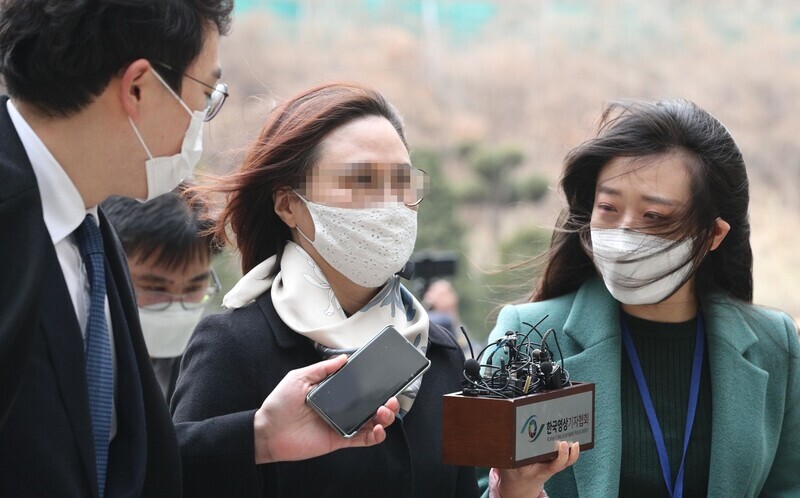hankyoreh
Links to other country sites 다른 나라 사이트 링크
[Editorial] Regarding the court’s verdict against Chung Kyung-shim

Chung Kyung-shim, professor at Dongyang University and wife of former Minister of Justice Cho Kuk, was taken into custody on Dec. 23 after receiving a stiff four-year sentence on charges of academic fraud and insider trading.
While the court dismissed some charges related to a private equity fund, it convicted Chung of 11 out of 15 charges. After 16 months, this marked the first legal decision in the Cho Kuk controversy, which started with a full-scale investigation by prosecutors in the wake of Cho’s nomination as justice minister in August 2019.
The court found Chung guilty on all counts related to forging the academic records of her daughter, including forcing the president of Dongyang University to provide a commendation. In explaining its verdict, the court noted how Chung’s actions have “damaged public faith in the country’s university admissions system.”
While this was only an initial ruling, the conviction of academic fraud poses a heavy legal and ethical burden for Chung. When parents exploit their social and professional status to secure advantages for their children in the vicious competition to get into top universities, they erode the country’s values of justice and fairness. However, Chung shouldn’t be the only one punished.
Regarding allegations of financial impropriety, Chung was convicted of insider trading while using an account under a false name. The court concluded that she had “sought to evade the financial transparency that South Korean society demands of high-ranking officials,” adding that she had “violated her professional obligation to perform her official duties without conflicts of public and private interests.”
In contrast, the court dismissed charges of misappropriating funds from Co-Link Private Equity by means of a phony consulting contract and a falsified investment report to the Financial Services Commission. This dismissal of key charges related to Co-Link Private Equity — which had been the crux of the prosecutors’ investigation of Cho — means that prosecutors will have a tough time avoiding accusations of being excessive and abusing their authority.
Critics had contended that despite the investigation’s enormous scale, the content of the actual indictment had little to do with any “abuse of power,” as demonstrated by the court’s dismissal of key charges. While the charges of academic fraud are serious in nature, the people need to know why such a heated investigation focused exclusively on one family.
Chung’s attorney announced plans to appeal, contending that there had been a “repeat of the same prejudgments and speculation that we had been fighting since the investigation began, along with the factor of prejudice.”
The next question revolves around the outcome of Cho’s trial, which relates to Chung’s in some of the charges. With many more stages to come in the long courtroom battle, we should respect the court’s verdict against Chung while patiently awaiting the final outcome — no jumping to conclusions.
Please direct comments or questions to [english@hani.co.kr]

Editorial・opinion
![[Column] The state is back — but is it in business? [Column] The state is back — but is it in business?](https://flexible.img.hani.co.kr/flexible/normal/500/300/imgdb/original/2024/0506/8217149564092725.jpg) [Column] The state is back — but is it in business?
[Column] The state is back — but is it in business?![[Column] Life on our Trisolaris [Column] Life on our Trisolaris](https://flexible.img.hani.co.kr/flexible/normal/500/300/imgdb/original/2024/0505/4817148682278544.jpg) [Column] Life on our Trisolaris
[Column] Life on our Trisolaris- [Editorial] Penalties for airing allegations against Korea’s first lady endanger free press
- [Editorial] Yoon must halt procurement of SM-3 interceptor missiles
- [Guest essay] Maybe Korea’s rapid population decline is an opportunity, not a crisis
- [Column] Can Yoon steer diplomacy with Russia, China back on track?
- [Column] Season 2 of special prosecutor probe may be coming to Korea soon
- [Column] Park Geun-hye déjà vu in Yoon Suk-yeol
- [Editorial] New weight of N. Korea’s nuclear threats makes dialogue all the more urgent
- [Guest essay] The real reason Korea’s new right wants to dub Rhee a founding father
Most viewed articles
- 1[Column] Why Korea’s hard right is fated to lose
- 2Amid US-China clash, Korea must remember its failures in the 19th century, advises scholar
- 3[Column] The state is back — but is it in business?
- 460% of young Koreans see no need to have kids after marriage
- 5Trump’s talk of flouting NATO promises sparks apprehension in Seoul
- 6[Column] Can Yoon steer diplomacy with Russia, China back on track?
- 7[Guest essay] Maybe Korea’s rapid population decline is an opportunity, not a crisis
- 8South Korea officially an aged society just 17 years after becoming aging society
- 9[Guest essay] The real reason Korea’s new right wants to dub Rhee a founding father
- 10AI is catching up with humans at a ‘shocking’ rate